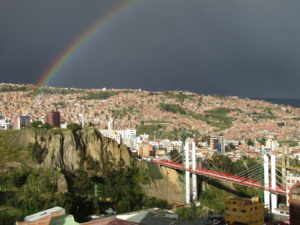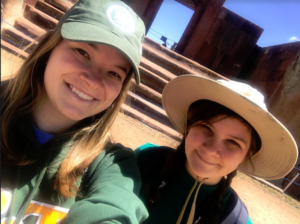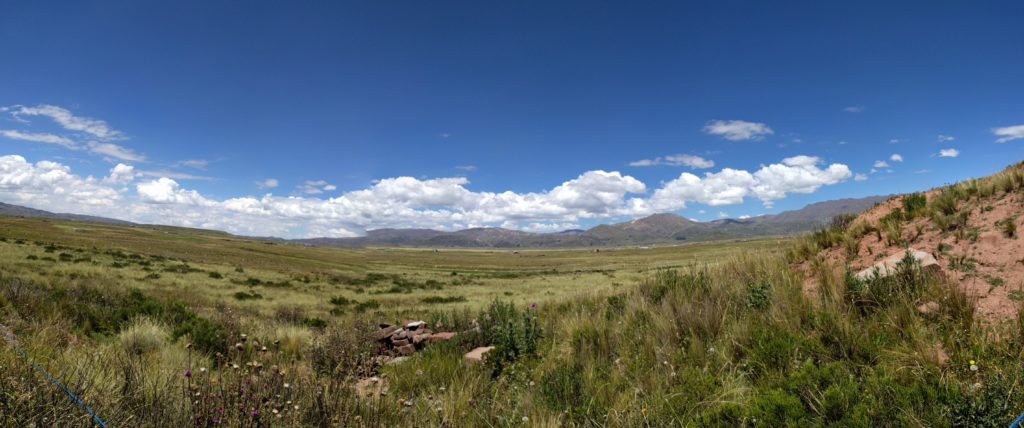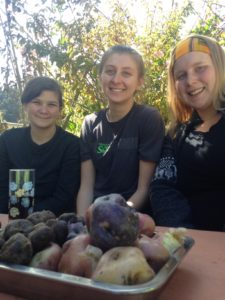By Katlyn Maas
 Before I left the States, my cousin from Chicago called me to talk to me about my travel to Bolivia. He had been deployed to South America for close to 2 years, and Bolivia was one of the countries he visited as a diplomatic bodyguard. He could tell I was nervous about the trip, so he reassured me by telling me that the people were friendly and that my Spanish was proficient enough that I could at least get my point across. “You’ll have so much fun in La Paz,” he had said. “Just be kind to the people, and they’ll return the favor to you.”
Before I left the States, my cousin from Chicago called me to talk to me about my travel to Bolivia. He had been deployed to South America for close to 2 years, and Bolivia was one of the countries he visited as a diplomatic bodyguard. He could tell I was nervous about the trip, so he reassured me by telling me that the people were friendly and that my Spanish was proficient enough that I could at least get my point across. “You’ll have so much fun in La Paz,” he had said. “Just be kind to the people, and they’ll return the favor to you.”
Once we entered Bolivia, I realized what he meant. The people were so friendly to all of us, and their hospitality was mind-blowing; I never would have imagined that the Bolivians would want to engage in detailed conversations with us all, whether it be about politics or music. They were just as curious about us as we were about them, which I also never expected. Even when we went to the rural community of Lupalaya, the people were interested in our culture, which is something else that I didn’t expect. It was so much more engaging than sitting there and being talked over to talk to our professors, which is what I was expecting more.
Our travels have definitely left a positive impact on me. I never knew that the people of Bolivia could be so friendly, but they obviously proved me wrong. I now have a better understanding and a higher respect for their culture, something I hope to keep experiencing in the future. One day, I’ll come back, but for now, I’ll keep my Spanish lessons and my cultural observations close to my heart.
By McKenzie Ruff
Bolivia was a great experience and I learned so much. Not only did I learn a lot about the language, but I learned a lot about Bolivian culture too. I think the biggest shock to me was how different the culture was from what  I was expecting, like how open everyone was about talking about politics. Here in America and in all the other countries I have been to, I have never been bombarded with so many political conversations or questions. It was a bit overwhelming and I am not the most open to political conversations because I have some close friends that have opposite political views and it is normally just a topic we avoid. However, almost every single person we talked to brought up politics—not just Bolivian politics, but also American and Peruvian politics. In America, it’s rare to hear about politics in South and Latin American countries, so it was odd to hear how invested Bolivians were in American politics. Another way La Paz specifically was different from what I was expecting was its layout and how massive the city was. It was absolutely breathtaking and I was in such awe when we went on the gondolas over the city or when we went to the outer rim of the city. I got to see and experience so much while in Bolivia and I had a magnificent time learning more about the Spanish language and Bolivian culture. I would love to go back because there were some things I didn’t get to see that I would really love to see.
I was expecting, like how open everyone was about talking about politics. Here in America and in all the other countries I have been to, I have never been bombarded with so many political conversations or questions. It was a bit overwhelming and I am not the most open to political conversations because I have some close friends that have opposite political views and it is normally just a topic we avoid. However, almost every single person we talked to brought up politics—not just Bolivian politics, but also American and Peruvian politics. In America, it’s rare to hear about politics in South and Latin American countries, so it was odd to hear how invested Bolivians were in American politics. Another way La Paz specifically was different from what I was expecting was its layout and how massive the city was. It was absolutely breathtaking and I was in such awe when we went on the gondolas over the city or when we went to the outer rim of the city. I got to see and experience so much while in Bolivia and I had a magnificent time learning more about the Spanish language and Bolivian culture. I would love to go back because there were some things I didn’t get to see that I would really love to see.
By Elisabeth Warner
 I am someone who has always wanted to travel. I have been to many places within the United States, and I have traveled abroad in Canada and Italy. Bolivia was different from anywhere I’ve been. Bolivians are passionate people, and most of the ones I met were all very cheerful. And very friendly. I had the opportunity to talk with a lady on my return flight, who invited me to visit her hometown next time I was in Bolivia. And that’s how it was most of the time. We were Americans, and stood out from the crowd, but they didn’t care. We talked with them, and they welcomed us.
I am someone who has always wanted to travel. I have been to many places within the United States, and I have traveled abroad in Canada and Italy. Bolivia was different from anywhere I’ve been. Bolivians are passionate people, and most of the ones I met were all very cheerful. And very friendly. I had the opportunity to talk with a lady on my return flight, who invited me to visit her hometown next time I was in Bolivia. And that’s how it was most of the time. We were Americans, and stood out from the crowd, but they didn’t care. We talked with them, and they welcomed us.
I think the most unique aspect of Bolivian culture (at least from an American standpoint) was how involved everyone was in politics—how much they wanted to discuss them at any given moment, but especially at meals. Even in the remote village of Lupalaya, politics were brought up over lunch. All of the graffiti was political as well. It changed my outlook on how I view politics here in the United States, and my idea on how involved the average person can and should be.
In January, I couldn’t tell you anything about Bolivia, let alone pinpoint it on the map. Now I feel innately connected to the people of Bolivia, and I believe that I will try to go back one day. Their culture is different from our own, but this isn’t bad. It’s new and exciting. I’ll always be glad that I visited Bolivia.
By Rachel Birchmier
 Before traveling to La Paz, Bolivia I didn’t have any solid expectations. Having not traveled far or often I had no basis for expectation except what I had read in books and U.S news sources. Most of what I read was from the assigned book Bolivia in Focus or from the Internet. One thing I learned was how politically involved and informed the people were in and around La Paz. Everyone was informed about the political environment of their own country as well as about a lot of world politics. Most of the graffiti around the city was political and one of the most popular topics for conversation was politics. While I have never minded political discussions, it’s considered a difficult topic in the United States, and I rarely hear discussions about politics beyond the scope of our own country. This trip taught me a lot about the importance of informing myself about events that influence the whole world rather than focusing only on information about my own country. It also taught me about different perspectives. A lot of the information I’ve learned in school and from U.S news sources has a biased perspective. It was refreshing and informative to hear the same news and histories I’d heard in the United States from the perspective of another country. This trip showed me the educational value of travel and allowed me to practice navigating in a new environment. I was also able to practice speaking Spanish and learn about a few of the other languages of Bolivia that I had never heard before. This was a great first travel experience. It inspires me to continue looking for new experiences and to continue to travel in the future when possible.
Before traveling to La Paz, Bolivia I didn’t have any solid expectations. Having not traveled far or often I had no basis for expectation except what I had read in books and U.S news sources. Most of what I read was from the assigned book Bolivia in Focus or from the Internet. One thing I learned was how politically involved and informed the people were in and around La Paz. Everyone was informed about the political environment of their own country as well as about a lot of world politics. Most of the graffiti around the city was political and one of the most popular topics for conversation was politics. While I have never minded political discussions, it’s considered a difficult topic in the United States, and I rarely hear discussions about politics beyond the scope of our own country. This trip taught me a lot about the importance of informing myself about events that influence the whole world rather than focusing only on information about my own country. It also taught me about different perspectives. A lot of the information I’ve learned in school and from U.S news sources has a biased perspective. It was refreshing and informative to hear the same news and histories I’d heard in the United States from the perspective of another country. This trip showed me the educational value of travel and allowed me to practice navigating in a new environment. I was also able to practice speaking Spanish and learn about a few of the other languages of Bolivia that I had never heard before. This was a great first travel experience. It inspires me to continue looking for new experiences and to continue to travel in the future when possible.